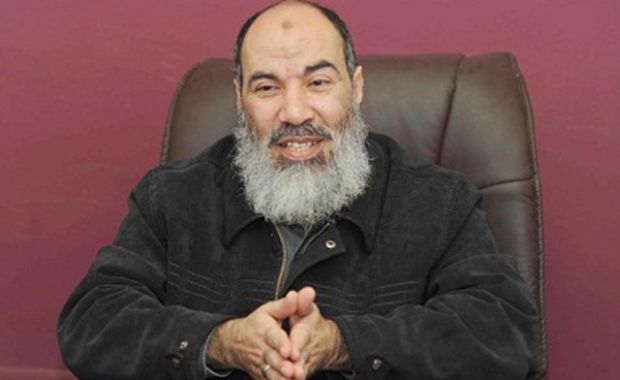
File photo of Al-Gama’a Al-Islamiya member Nageh Ibrahim. (AFP)
Cairo, Asharq Al-Awsat—Egypt’s military-backed government must rethink its methods of dealing with the outlawed Muslim Brotherhood, according to Salafist Al-Gama’a Al-Islamiyya ideologue Nageh Ibrahim.
In an interview with Asharq Al-Awsat, the senior Egyptian Islamist said: “The Egyptian government’s policy on the Islamist trend in general and the Muslim Brotherhood in particular requires thorough revision.”
Al-Gama’a Al-Islamiyya finds itself in a difficult position in post-Mursi Egypt following the outlawing of allies the Muslim Brotherhood. The group’s political wing, the Building and Development Party, are part of the pro-Mursi Anti-Coup Alliance, but have largely kept a low profile following his ouster. The Salafist Al-Nour Party, on the other hand, actively supported the Islamist president’s ouster, backing Egypt’s interim authorities.
Ibrahim stressed that Egypt’s interim military-backed government “must not allow one disaster to take place after another, only to wake from their slumber after it is too late.”
Commenting on the possibility of reconciliation between the Brotherhood and government, the senior Islamist said: There are obstacles facing this reconciliation . . . some from the Brotherhood’s side and others from the government’s side.”
The Salafist group had been outlawed under the Mubarak regime due to its responsiblity for a string of terrorist attacks across Egypt during the 1980s and 1990s. Al-Gama’a Al-Islamiya renounced violence in 2003 and entered national politics for the first time following the January 25 revolution. The former terrorist organization now finds itself one of Egypt’s more mainstream Islamist groups following the designation of the Muslim Brotherhood as a terrorist organization in December 2013.
Al-Gama’a Al-Islamiya has criticized Cairo’s decision to outlaw the Brotherhood, but Ibrahim acknowledged that reversing this decision could also prove difficult. He said that the complete fragmentation of the Brotherhood leadership—with senior members being either in prison or on the run—affects the group’s decision-making capabilities.
He cited “the “absence, so far, of any senior Brotherhood figure ready to announce the political, administrative and educational mistakes committed by the group in the period following the January 25 revolution” as another major obstacle to reconciliation.
Ibrahim implicitly criticized the Brotherhood for their failures in government, saying this had harmed the entire Islamist trend in Egypt. He acknowledged that “a large segment in Egypt today, most prominently the liberal and Left-wing parties and the Christian community, do not welcome the return of the Brotherhood to the political arena.”
He stressed that the Islamist retreat in Egypt is not just in the political arena, but has affected all other aspects of life: “Following Mursi’s ouster, the Islamist trend has seen a withdrawal in its Da’wa [proselytism], educational and administrative activities.”
“Most of the Egyptian street no longer trusts Islamist to lead Egypt or assume political posts, at least in the short term,” he said.
Ibrahim said that Egypt’s Islamists need to review their performance and activities if they mean to make a return to politics, adding that “some [Egyptians] reject all Islamists as the result of the violence, bombings and assassinations committed by some Islamist factions.”
“The most dangerous thing that has happened to the Islamist trend in Egypt is its voluntary abandonment of the position of Da’wa and guidance, transforming into a purely political movement revolving around power,” he told Asharq Al-Awsat.
